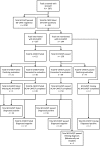Autism Screening With Online Decision Support by Primary Care Pediatricians Aided by M-CHAT/F
- PMID: 27542847
- PMCID: PMC5005015
- DOI: 10.1542/peds.2015-3036
Autism Screening With Online Decision Support by Primary Care Pediatricians Aided by M-CHAT/F
Abstract
Background and objective: Autism spectrum disorders (ASDs) often go undetected in toddlers. The Modified Checklist for Autism in Toddlers (M-CHAT) With Follow-up Interview (M-CHAT/F) has been shown to improve detection and reduce over-referral. However, there is little evidence supporting the administration of the interview by a primary care pediatrician (PCP) during typical checkups. The goal of this study was to evaluate the feasibility, validity, and reliability of the M-CHAT/F by PCPs with online prompts at the time of a positive M-CHAT screen.
Design: Forty-seven PCPs from 22 clinics completed 197 M-CHAT/Fs triggered by positive M-CHAT screens via the same secure Web-based platform that parents used to complete M-CHATs before an 18- or 24-month well-child visit. A second M-CHAT/F was administered live or by telephone by trained research assistants (RAs) at the Kennedy Krieger Institute Center for Autism and Related Disorders. The Autism Diagnostic Observation Schedule, Second Edition, and the Mullen Scales of Early Learning were administered as criterion measures. Measures of agreement between PCPs and RAs were calculated, and measures of test performance compared.
Results: There was 86.6% agreement between PCPs and RAs, with a Cohen's κ of 0.72. Comparison of sensitivity, specificity, positive predictive value (PPV), and overall accuracy for M-CHAT/F between PCPs and RAs showed significant equivalence for all measures. Use of the M-CHAT/F by PCPs resulted in significant improvement in PPV compared with the M-CHAT alone.
Conclusions: Minimally trained PCPs can administer the M-CHAT/F reliably and efficiently during regular well-child visits, increasing PPV without compromising detection.
Copyright © 2016 by the American Academy of Pediatrics.
Conflict of interest statement
POTENTIAL CONFLICT OF INTEREST: This study was conducted by the Center for Promotion of Child Development through Primary Care and its for-profit subsidiary, Total Child Health (TCH), Inc. The Child Health and Development Interactive System (the Web tool used in the study) was developed by Dr Sturner and his spouse, Dr Howard. Dr Sturner is Director of the center and Dr Howard is President of TCH. Both are members of the Board of Directors of both entities and are paid consultants to both entities. Dr Morrel is an employee of TCH and a stockholder in the company. The other authors have indicated they have no potential conflicts of interest to disclose.
Figures
Comment in
-
Use of the M-CHAT follow-up interview (M-CHAT/F) by paediatricians during well-child care visits is feasible, valid and reliable.Evid Based Med. 2017 Aug;22(4):156. doi: 10.1136/ebmed-2016-110654. Epub 2017 Jun 29. Evid Based Med. 2017. PMID: 28663203 No abstract available.
References
-
- National Research Council In: Lord C, McGee JP, eds. Educating Children With Autism. Washington, DC: National Academies Press; 2001
-
- Howlin P, Magiati I, Charman T. Systematic review of early intensive behavioral interventions for children with autism. Am J Intellect Dev Disabil. 2009;114(1):23–41 - PubMed
-
- Harris S, Handelman J. Age and IQ at intake as predictors of placement for young children with autism: a four- to six-year follow-up. J Autism Dev Disord. 2000;30(2):137–142 - PubMed
-
- Wetherby AM, Woods J, Allen L, Cleary J, Dickinson H, Lord C. Early indicators of autism spectrum disorders in the second year of life. J Autism Dev Disord. 2004;34(5):473–493 - PubMed
Publication types
MeSH terms
Grants and funding
LinkOut - more resources
Full Text Sources
Other Literature Sources
Medical


